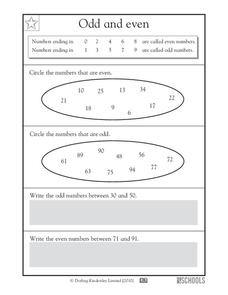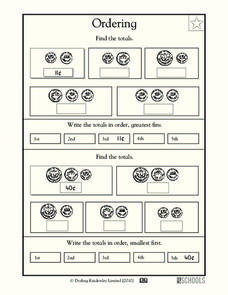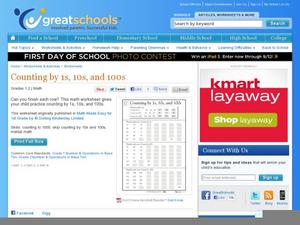Curated OER
Doubles
These dragons work as math machines as scholars multiply numbers using given functions, which remain the same for these: double it. Using an example as their guide, learners double three whole numbers, none of which exceed 11, for each...
Curated OER
Fact Families - Part 2
Complete these fact families; mathematicians use addition number sentences to write three more equations, all of which are members of the same fact family. There is an example here to guide them, and they solve for nine more number...
DK Publishing
Counting Caterpillars
These caterpillars each have a number sequence printed on their segmented bodies, but some numbers are missing! Look at the completed caterpillars as an example, asking kids to notice a possible pattern. They should observe that the...
Curated OER
Odd and Even
After you've introduced even and odd numbers give pupils this exercise for some independent practice. A brief introduction gives them the definition of even and odd by listing the ending numbers for both types. Be sure to reinforce the...
Curated OER
Density - An Intrinsic Property
Learners discover the property of density while participating in a lab exercise. In this scientific measuring lesson, pupils utilize a scale to measure the density of different metal materials. They document their work and present their...
Curated OER
Length
Without using a ruler, learners estimate the relative length of various lines in these three scenarios. The first two are set up as maps, with learners determining the shortest and longest distances from one position to another. The last...
DK Publishing
Addition Practice #3
If you're in search of some basic addition drills, take a look at this for your second and third graders. There are 20 vertically aligned equations here, each with one three-digit addend and one...
Curated OER
Adding Dice
Roll the dice! These addition number sentences are for beginning mathematicians, and each addend is displayed on a die. Learners add up two or three single-digit addends to find eight sums in the first half of this worksheet. Next, they...
Curated OER
Drops on a Penny
Young scientists explore the concept of surface tension at is applies to water. In this activity, learners use a dropper to place drops of water on a penny. Each group guesses how many drops a heads-up penny will hold, then conducts the...
Curated OER
Ordering
Money is a great medium for math problems, and learners practice with coins in these addition equations. First, they add up five sets of coins (one is done for them), writing down the totals below each. Next, scholars sequence these...
Curated OER
Comparing Areas
Before your scholars know how to multiply side lengths to find an area, give them some practice in simply counting units. They examine shapes that have already been segmented into units, counting them to get the area. There are three...
Curated OER
Counting by 1s, 10s, and 100s
These sequences are missing numbers and require some skip counting to complete. Scholars finish rows of numbers first counting by 1s, then 10s, and finally 100s. Each has three given numbers to get them started, and they fill in five...
Curated OER
Counting Down
It's time for liftoff for these math rockets and the only way to get them into the sky is through the power of subtraction! Scholars begin with a double-digit number, subtracting numbers in a sequence to reach zero. There are four...
Curated OER
Counting by 10s
You've got their attention once candy is the focus of a math worksheet! Learners count by 10 to determine how many candies are in each set, which are all grouped by 10. There is an example and number line to help them, and they write the...
Curated OER
Read, Write, and Draw
Numbers come in many forms, and they often appeal to different types of leaners. Explore these forms through six place-value problems which have youngsters represent values numerically, in word form, and through base-ten blocks. They...
Curated OER
Counting by 3s, 4s, and 5s
Skip count along the mushrooms to complete these number sentences which give young scholars an introductory look at addition and subtraction. Starting from five double-digit numbers, they subtract or add by threes, fours, and fives to...
Curated OER
Addition Word Problems #1
Math is all around us, and scholars observe various addition scenarios as they solve 15 word problems. Each of these involve two-digit addends, some of which are money values. Although there are no decimals or fractions, learners do...
DK Publishing
Addition with 3-Digit Numbers #1
Once your mathematicians can add two-digit numbers, it's time to bring on the three-digit addends. Here are 20 practice problems, each involving two whole-number addends. Learners do not need to regroup for any of these, and they have...
Curated OER
Subtracting
Help kids visualize subtraction by assigning these sets of objects for them to subtract. They examine an example before completing the seven equations on their own. For each, learners cross out the subtrahend value and count the...
Curated OER
Counting Money
Money is always a source of interest for young mathematicians, so utilize their engagement by adding up coin values. For each set of coins (quarter, dime, nickel, and penny) scholars count up and write the total. The example has them...
Curated OER
Patterns
Follow the pattern to find what comes next. Youngsters analyze shape patterns to continue the sequence in the provided space. The three patterns increase in difficulty, and then scholars have a chance to create two of their own....
Curated OER
Fact Families
These fact families need to be completed. Scholars use addition and subtraction to complete four number sentences for each set of three numbers. The sentences are all part of the number set's fact family, and demonstrate the commutative...
Curated OER
Equal Value
Which coins add up to these values? Young mathematicians examine five cent values, circling the coins needed to amount to them. Next, they compare money values in four sets of coins. First, learners add up each set to find the total...
Curated OER
Comparing and Ordering
Before handing out this number comparison activity, ask scholars to pick a number between 20 and 50. Could they do it? Explain that they chose a number greater than 20 and less than 50, which is exactly what they will be doing next. Each...























